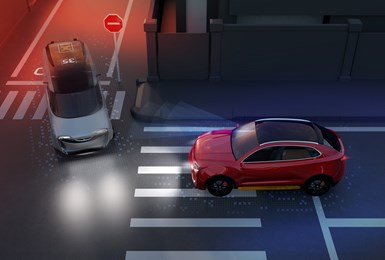Toyota CSRC Funding Four New Safety Research Studies
They’ve been advancing safety for nearly 10 years and show no signs of stopping
#regulations
What:
The Toyota’s Collaborative Safety Research Center (CSRC) is investing $1-million in four research projects aimed at enabling safer and more efficient mobility systems by exploring driver behavior in different environments, monitoring driver health and identifying driver error when interacting with advanced driver assistance systems (ADAS) technologies.
The projects are:
- Roadmanship Integrated Advanced Driver Assistance Systems. Determine how roadmanship characteristics (e.g., driving in a courteous manner in addition to being safe) can be used to help define ADAS or automated driving design criteria across a number of driving contexts (e.g., different weather conditions, different levels of traffic congestion). Collaborator: University of Michigan

Roadmanship matters. (Image: Toyota CSRC)
- Investigation of Postural Response Time to Avoid a Fall. Determine if it is possible to design an alert to autonomous shuttle riders to adjust their balance and prepare for a sudden stop and avoid a fall. Collaborator: Miami University
- Feasibility and Utility of the Car as a Platform for Indexing Driver Health and Disease. Assess the feasibility and utility of monitoring the driver to detect health and disease and provide a high-level innovative technology framework that uses sensors in available and future vehicle technology to detect driver health and disease, enabling safer and more efficient use of mobility systems. Collaborator: University of Nebraska
- Identifying Deviations from Normal Driving Behavior. Demonstrate the utility and value of integrated multi-domain data (e.g., vehicle, driver, infrastructure, crash record) in identifying driver behaviors, including driver errors and poor performance when interacting with modern ADAS systems. Collaborators: Texas A&M Transportation Institute and State Farm
Quote:
“These studies will help us better align advanced vehicle technologies with the driver’s needs and allow us to design and develop systems that are ultimately intuitive and easy for drivers to use,” said Jeff Makarewicz, group vice president, Toyota Motor North America, Advanced Mobility Research & Development.
Context:
Based in Ann Arbor, Michigan, and established in 2011, the CSRC has initiated 63 research projects with 31 partner universities, publishing more than 400 papers. It is working hard at understanding human factors in the context of transportation.
As is often the norm when it comes to auto-funded safety, information is shared across the industry: CSRC will make the data from these four studies publicly available so other organizations can build on it.
RELATED CONTENT
-
CARB Predicts 10x Hike in Fuel Cell Vehicles by 2024
California expects the number of fuel cell-powered vehicles registered in the state will surge to 23,600 units in 2021 from 4,800 through May of this year and reach 47,200 by 2024.
-
Self-Driving Chevy Bolt Ticketed for Driving Too Close to Pedestrian
Police in San Francisco ticketed the backup driver in a self-driving Chevrolet Bolt for allowing the car to drive too close to a pedestrian in a crosswalk in San Francisco.
-
Study: How States Should Update Traffic Laws for Autonomous Cars
U.S. states should require that all automated cars have a licensed driver on board, suggests a study by the Governors Highway Safety Assn.


.jpg;width=70;height=70;mode=crop)